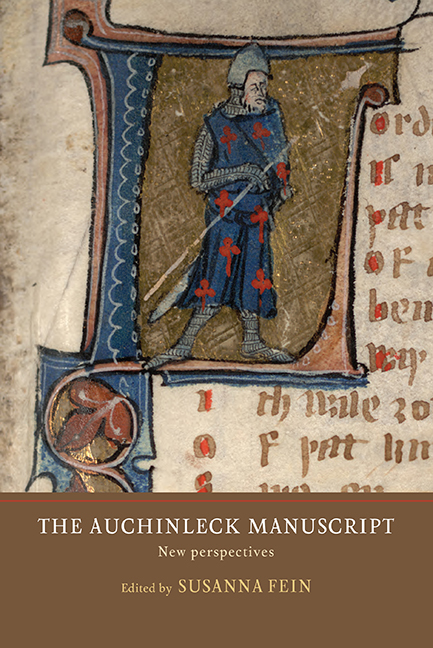Book contents
- Frontmatter
- Contents
- List of Illustrations
- List of Contributors
- Acknowledgements
- Abbreviations
- Note on the Presentation of Auchinleck Texts
- Introduction The Auchinleck Manuscript: New Perspectives
- 1 The Auchinleck Manuscript Forty Years On
- 2 Codicology and Translation in the Early Sections of the Auchinleck Manuscript
- 3 The Auchinleck Adam and Eve: An Exemplary Family Story
- 4 A Failure to Communicate: Multilingualism in the Prologue to Of Arthour and of Merlin
- 5 Scribe 3’s Literary Project: Pedagogies of Reading in Auchinleck’s Booklet 3
- 6 Absent Presence: Auchinleck and Kyng Alisaunder
- 7 Sir Tristrem, a Few Fragments, and the Northern Identity of the Auchinleck Manuscript
- 8 The Invention of King Richard
- 9 Auchinleck and Chaucer
- 10 Endings in the Auchinleck Manuscript
- 11 Paraphs, Piecework, and Presentation: The Production Methods of Auchinleck Revisited
- 12 Scribal Corrections in the Auchinleck Manuscript
- 13 Auchinleck ‘Scribe 6’ and Some Corollary Issues
- Bibliography
- Index of Manuscripts Cited
- General Index
- Manuscript Culture in the British Isles
11 - Paraphs, Piecework, and Presentation: The Production Methods of Auchinleck Revisited
Published online by Cambridge University Press: 21 May 2021
- Frontmatter
- Contents
- List of Illustrations
- List of Contributors
- Acknowledgements
- Abbreviations
- Note on the Presentation of Auchinleck Texts
- Introduction The Auchinleck Manuscript: New Perspectives
- 1 The Auchinleck Manuscript Forty Years On
- 2 Codicology and Translation in the Early Sections of the Auchinleck Manuscript
- 3 The Auchinleck Adam and Eve: An Exemplary Family Story
- 4 A Failure to Communicate: Multilingualism in the Prologue to Of Arthour and of Merlin
- 5 Scribe 3’s Literary Project: Pedagogies of Reading in Auchinleck’s Booklet 3
- 6 Absent Presence: Auchinleck and Kyng Alisaunder
- 7 Sir Tristrem, a Few Fragments, and the Northern Identity of the Auchinleck Manuscript
- 8 The Invention of King Richard
- 9 Auchinleck and Chaucer
- 10 Endings in the Auchinleck Manuscript
- 11 Paraphs, Piecework, and Presentation: The Production Methods of Auchinleck Revisited
- 12 Scribal Corrections in the Auchinleck Manuscript
- 13 Auchinleck ‘Scribe 6’ and Some Corollary Issues
- Bibliography
- Index of Manuscripts Cited
- General Index
- Manuscript Culture in the British Isles
Summary
IN the years since a probative version of this paper was presented at the LOMERS Conference in London, in July 2008, two important studies in palaeography and in codicological methodology have appeared that may change the way scholars approach the study of manuscript production and of the communities of scribes and artisans who completed those manuscripts in the fourteenth century. The landmark work of Linne Mooney and Estelle Stubbs in their identification of the scribes engaged in the London Guildhall and in the production of literary manuscripts will undoubtedly shape the future of manuscript studies. Having identified by name those scribes producing the works of Chaucer, Gower, and Langland while employed in the Guildhall, Mooney and Stubbs demonstrate a fascinating connection between the clerks in the city and the production of literary manuscripts. To be sure, their study has some qualifications: the clerks copied the works of authors with whom they were often familiar; they worked some fifty years or more after the production of the Auchinleck manuscript (Edinburgh, NLS, MS Advocates 19. 2. 1); they appear to have been acquainted with one another; and they seem to have had an agenda larger than the mere copying of these poets’ texts – that is, ‘the preservation and dissemination of literature written in English’ as part of a broad political aim. Whether similar evidence will appear of clerks’ involvement in manuscripts produced decades earlier, like Auchinleck, remains to be seen. And I would add one final caution: we must not be too eager to lay all, or even most, literary manuscript production at the feet of this type of scribe. To do so would be to ignore the evidence, produced by such scholars as C. Paul Christianson, of the stationers, scribes, and other artisans engaged in the production of manuscripts in the London area.
The second study is one that promises a new direction for codicological studies. Helen Marshall has studied the paraphs in the work of Scribe 2 in Auchinleck, and she has found some evidence suggestive of the existence of this parapher's work – perhaps Auchinleck Scribe 2 himself – in another manuscript: London, BL, MS Egerton 1993.
- Type
- Chapter
- Information
- The Auchinleck Manuscript: New Perspectives , pp. 176 - 194Publisher: Boydell & BrewerPrint publication year: 2016

